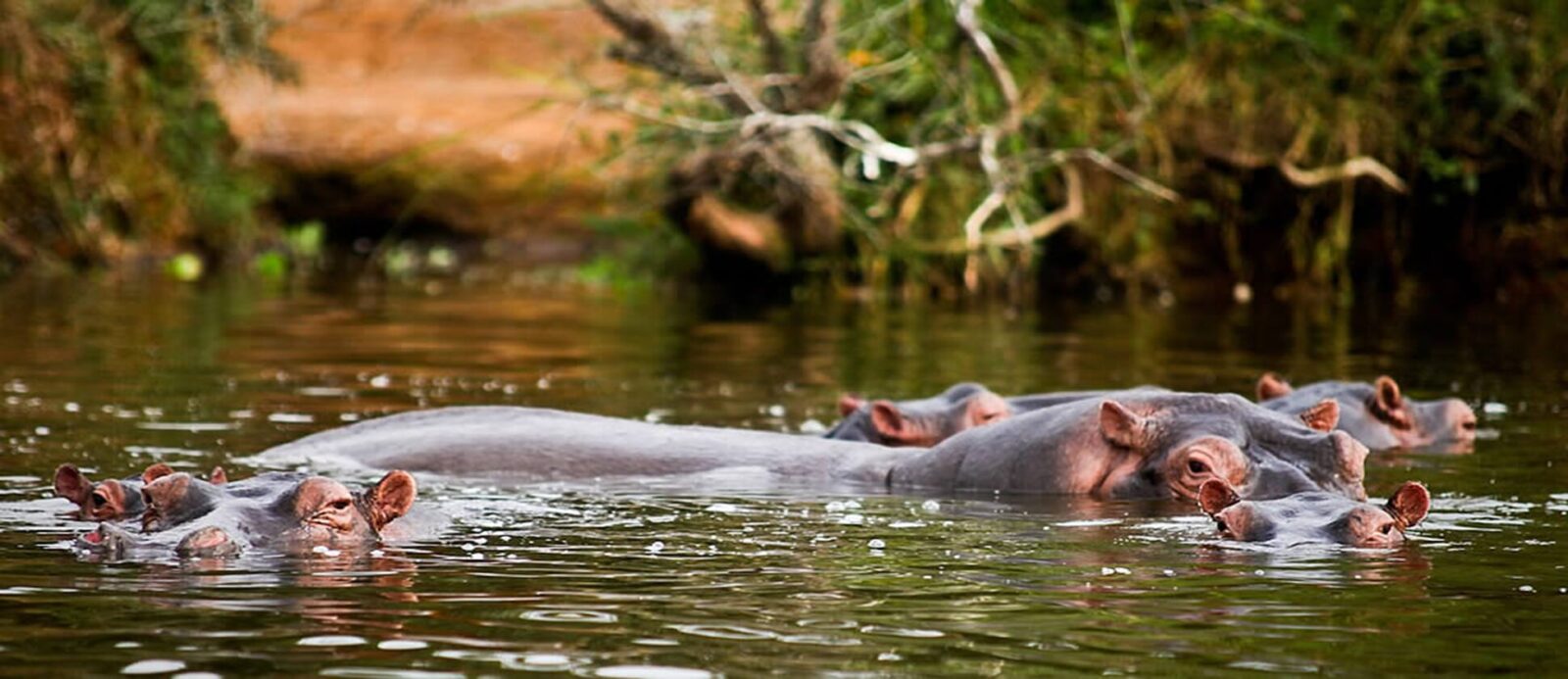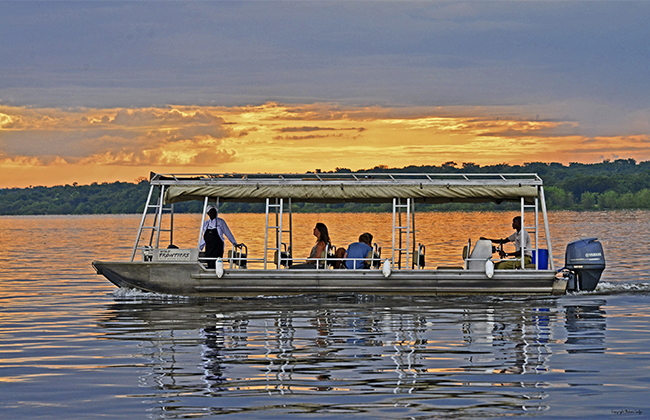Boat Safaris on Lake Mburo: What to Expect
Discovering Uganda’s Hidden Waterways
While African safaris are often associated with the golden savannahs, towering giraffes, and thundering herds of buffalo, a more serene and intimate form of exploration exists in Lake Mburo National Park—the boat safari. This experience offers a unique perspective on the park, where wildlife and water converge, creating moments of tranquility and awe that cannot be replicated on traditional game drives.
Lake Mburo, though small in comparison to Uganda’s larger parks, harbors a network of lakes and wetlands teeming with life. The waters of Lake Mburo and its surrounding lagoons are home to hippos, crocodiles, and a remarkable diversity of birds, offering travelers opportunities for encounters that blend observation with reflection. A boat safari on this lake provides a rhythm of discovery that is slower and more deliberate, allowing every sighting to be savored.
This article explores what travelers can expect on boat safaris in Lake Mburo National Park, examining the wildlife, landscapes, seasonal variations, and practical considerations to ensure an immersive and unforgettable experience.
The Setting: Lake Mburo National Park and Its Lakes
Lake Mburo National Park, situated in Kiruhura District, western Uganda, covers roughly 370 square kilometers and is distinguished by its combination of savannah, woodland, wetlands, and rocky outcrops. Central to its appeal is Lake Mburo, a shallow lake fringed with papyrus swamps and dotted with smaller islands, which provides a haven for both terrestrial and aquatic wildlife.
The lake is fed by streams and seasonal rainfall, creating a dynamic aquatic environment that supports a variety of species. Hippos and crocodiles dominate the waters, while the surrounding papyrus and reeds attract rare and colorful birdlife. Floating lilies and reed beds provide shelter for fish and amphibians, adding to the lake’s ecological richness. For visitors, the landscape offers a peaceful contrast to the more open savannah plains, highlighting the diversity of Lake Mburo’s ecosystems.
The Appeal of Boat Safaris
Boat safaris offer a distinctive form of wildlife observation, emphasizing intimacy and calm. Unlike game drives, where vehicles and engines can disturb animals, boats allow travelers to approach wildlife silently, providing a closer connection to nature. Hippos, often partially submerged, can be observed at leisure, while crocodiles rest along the banks, their presence commanding both respect and fascination.
Birdwatching is another highlight, as the lake attracts species such as the African fish eagle, herons, kingfishers, cormorants, and the elusive shoebill stork. Migratory birds frequently visit during wet seasons, enriching the visual experience with striking plumage and unique behaviors. The gentle motion of the boat and the open horizon create ideal conditions for photography, reflection, and deep engagement with the ecosystem.
Boat safaris are not only for observation but also provide an opportunity to appreciate the tranquility of the lake and the surrounding landscape, where distant hills, rippling waters, and shimmering sunlight combine to form a living painting of Uganda’s wilderness.
What Wildlife to Expect
Lake Mburo’s waters support a diverse array of wildlife that can be observed during boat safaris. Hippos dominate the scene, often seen wallowing in shallow waters or surfacing to breathe. Their massive bodies and characteristic grunts provide both a visual and auditory signature of the lake’s ecosystem. Crocodiles, masters of stealth, lie partially submerged, their eyes and snouts barely visible above the surface, offering thrilling encounters without disturbance.
Birdlife is prolific and varied. The African fish eagle, with its iconic white head and loud call, frequently perches on trees or floats above the water, while kingfishers dart skillfully across the lake, diving to catch fish. Herons, storks, and cormorants are often spotted hunting along the shore, while the rare shoebill stork inhabits papyrus channels, revealing itself only through patience and attentive observation.
On occasion, animals from the surrounding savannah can be glimpsed from the water. Zebras, impalas, and buffaloes often graze near the lake’s edge, creating dynamic interactions between terrestrial and aquatic wildlife that enhance the safari experience. This proximity to multiple ecosystems within a single frame is one of the defining characteristics of Lake Mburo’s boat safaris.
Seasonal Variations and Their Impact
The timing of a boat safari profoundly influences what can be observed. During the dry seasons, from June to August and December to February, water levels are lower, concentrating aquatic species and making hippos, crocodiles, and waterbirds more visible. Migratory patterns of birds are also influenced by seasonal availability of food and water, creating predictable opportunities for sightings.
The wet seasons, from March to May and September to November, bring rising water levels, lush vegetation, and a surge of migratory birds. Although some areas may become less accessible, the abundance of life, including breeding behaviors and lush landscapes, creates a vibrant and immersive experience. Water levels can also transform the lake, revealing channels, small islands, and flooded papyrus beds that offer new perspectives and photography opportunities.
Each season provides distinct experiences: the dry season offers ease of navigation and concentrated wildlife sightings, while the wet season emphasizes diversity, movement, and a flourishing ecosystem.
Observing Behavior from the Boat
One of the advantages of boat safaris is the opportunity to witness natural behavior up close. Hippos, for example, can be observed surfacing, socializing, and occasionally vocalizing, revealing complex social structures and interactions. Crocodiles bask along the banks, and attentive observation can reveal hunting behaviors, territorial disputes, or courtship rituals.
Birds provide continuous engagement, with kingfishers diving into the water, herons stalking fish, and African fish eagles swooping from above. Observing these interactions from the water, without disturbing the animals, creates a sense of harmony and immersion that is difficult to achieve through other safari modalities. The slow pace of the boat allows for extended observation, enabling travelers to appreciate details such as plumage patterns, feeding techniques, and the rhythms of daily life in the lake ecosystem.
Navigating the Lake Safely
Boat safaris in Lake Mburo are conducted under the guidance of experienced local operators, who ensure safety while maximizing wildlife encounters. Boats are typically small and stable, allowing for quiet movement and close access to key habitats. Life jackets, safety briefings, and knowledge of water depths and currents are standard components of the experience, ensuring a secure journey.
Guides possess detailed knowledge of the lake’s geography, wildlife distribution, and birding opportunities. Their expertise enhances the safari, offering insights into animal behavior, conservation issues, and ecological relationships. Travelers are advised to follow instructions closely, maintain low noise levels, and avoid sudden movements, both for safety and to preserve the natural behavior of the wildlife.
Complementing Boat Safaris with Other Activities
Lake Mburo offers a variety of safari experiences, and boat safaris can be seamlessly combined with game drives, walking safaris, and horseback safaris. While boat excursions focus on aquatic and lakeside species, game drives reveal terrestrial mammals such as zebras, impalas, and buffaloes. Walking and horseback safaris provide intimate access to smaller mammals, bird species, and plant life in the surrounding landscapes.
This combination of experiences allows travelers to explore the park from multiple perspectives, gaining a comprehensive understanding of its ecosystems. The contrast between the serenity of the water and the dynamism of the savannah creates a rich and multifaceted safari adventure.
Practical Tips for an Optimal Boat Safari
Successful boat safaris in Lake Mburo require preparation and attention to detail. Morning and late afternoon excursions are recommended, as wildlife is most active during cooler periods. Binoculars and cameras enhance the experience, while neutral clothing helps avoid startling wildlife.
Seasonal considerations, including water levels and migratory patterns, should inform planning. Early booking is advised, particularly during dry seasons when wildlife concentrations and favorable weather attract more visitors. Following park regulations, maintaining respectful distances, and listening to guides ensures both safety and the preservation of the ecosystem.
Conservation Significance
Boat safaris in Lake Mburo are not only recreational but also contribute to conservation awareness. The park protects critical wetland and lake habitats, sustaining both resident and migratory species. Observing wildlife in its natural environment fosters appreciation for conservation, highlighting the importance of preserving these ecosystems for future generations.
Guides often provide educational commentary, explaining the ecological roles of species, the impact of seasonal changes, and ongoing conservation efforts. Travelers gain not only enjoyment but also understanding, making their safari a meaningful engagement with Uganda’s natural heritage.
The Best Time for a Boat Safari
While boat safaris can be enjoyed year-round, the dry seasons from June to August and December to February are ideal for concentrated sightings of hippos, crocodiles, and waterbirds. The calm waters and clear skies provide excellent photographic conditions and uninterrupted observation opportunities.
The wet seasons from March to May and September to November bring lush landscapes and migratory birds, offering vibrant visual experiences and unique behavioral observations. Visitors seeking diversity, greenery, and seasonal changes may prefer the wet season despite challenges in navigation.
Both seasons provide unforgettable encounters, but the choice depends on priorities—whether concentrated wildlife sightings and ease of access or lush scenery and migratory bird activity are desired.
A Waterborne Journey into the Wild
Boat safaris on Lake Mburo offer a distinctive and immersive perspective on Uganda’s wilderness. The interplay between aquatic and terrestrial habitats, the proximity to iconic species such as hippos, crocodiles, and African fish eagles, and the tranquility of gliding across shimmering waters create an experience that is simultaneously serene and exhilarating.
For travelers seeking a safari that blends wildlife observation, photography, and ecological insight, a boat safari provides a unique lens into the park’s rich ecosystems. Complemented by game drives, walking, and horseback safaris, this experience ensures a holistic and memorable exploration of Lake Mburo National Park.
To embark on this exceptional journey and explore the waters and wildlife of Lake Mburo, travelers are encouraged to book their Africa tours and safaris with WildHorn Africa, a trusted partner in crafting unforgettable safari experiences in Uganda.






